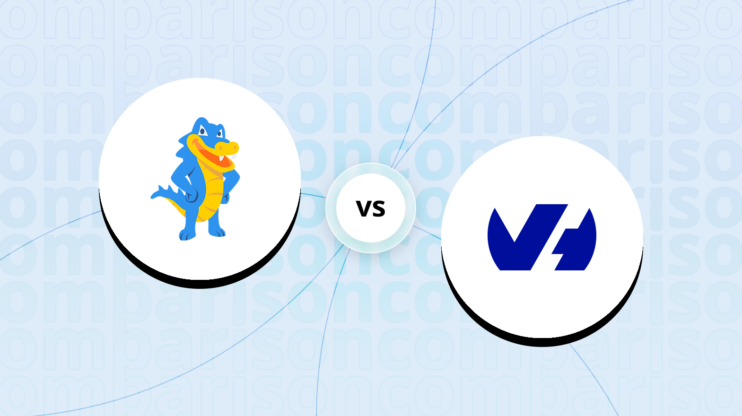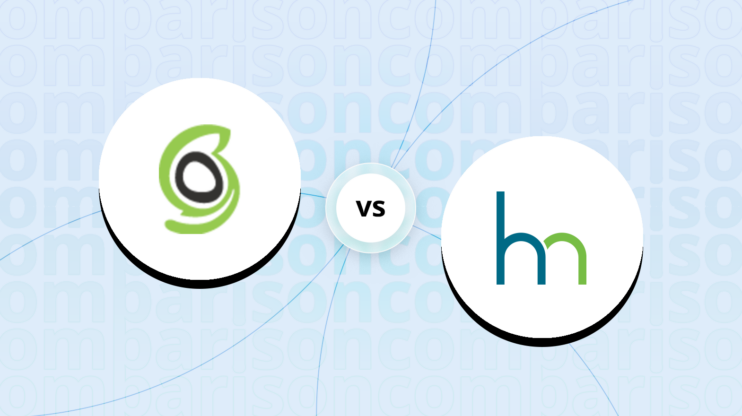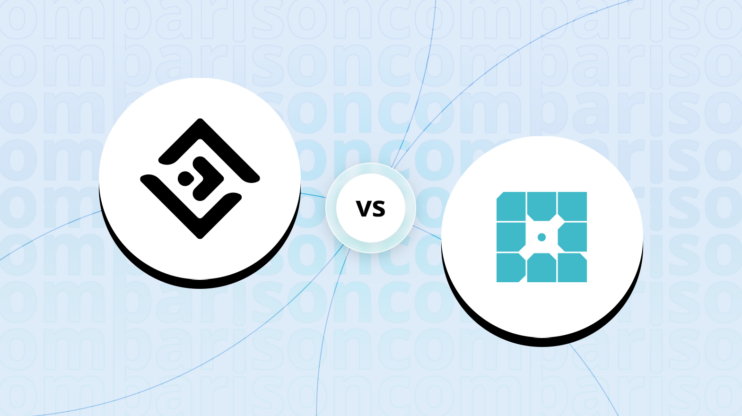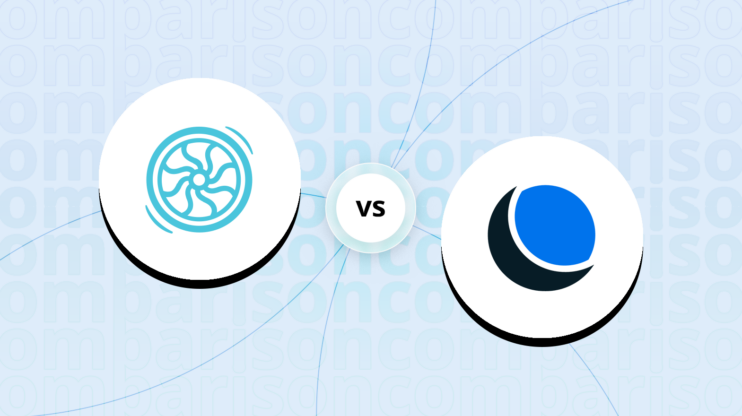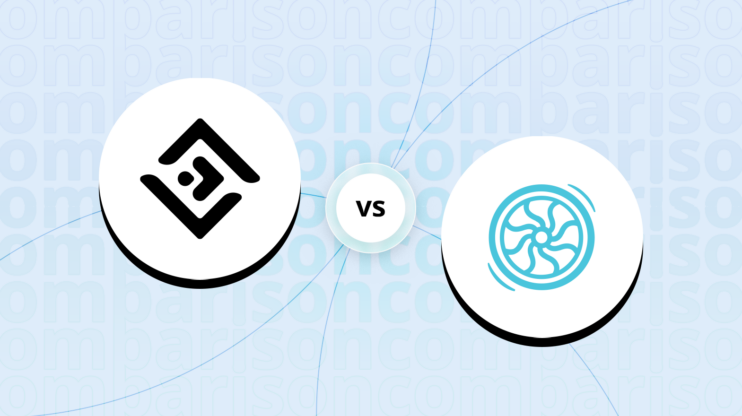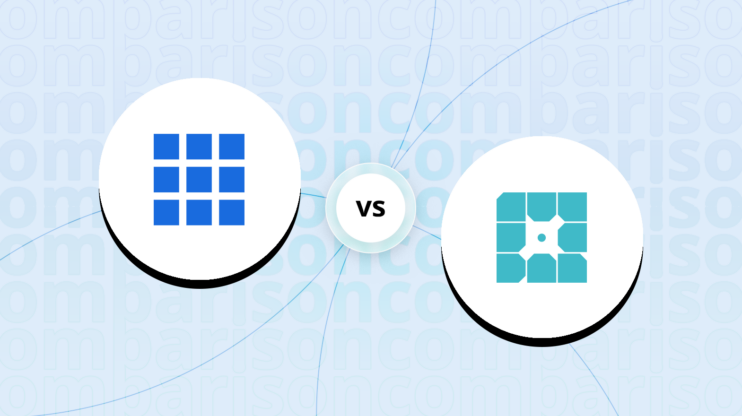Dreamhost vs Hetzner: Final verdict
Looking over DreamHost vs. Hetzner, both hosting services offer reliable options with distinct strengths tailored to different user needs.
-
DreamHost (Overall grade: 8.2)
stands out with its specialized WordPress hosting, notable security measures, and user-friendly interface. With a 100% uptime guarantee and high performance, it excels in handling website demands efficiently. DreamHost provides an extensive range of hosting options, including shared, VPS, and dedicated hosting, and supports multimedia content with robust media management. It also features a custom-built control panel, easy migration tools, and continuous customer support, which makes it an excellent choice for beginners and professionals alike. Nonetheless, the lack of direct phone support and occasional slow response times from customer service can be drawbacks.
-
Hetzner (overall grade: 7.9)
is favored for its versatile cloud and VPS solutions, as well as strong security with ISO 27001 certified data centers. Hetzner offers competitive pricing, high-performance NVMe SSDs, and flexible scalability without minimum contracts, making it a valuable choice for agencies and high-traffic websites. Its emphasis on reliable infrastructure and GDPR compliance appeals particularly to European customers. However, Hetzner falls short with no live chat support, limited language options for customer service, and no specialized WordPress hosting. While its control panel might seem less intuitive compared to DreamHost, Hetzner still provides effective user management and operational security features.
 Overall grade:8.2 |
 Overall grade:7.9 |
|
|---|---|---|
| Uptime and Availability | 8.5 | 9.0 |
| Hosting Performance | 7.8 | 8.3 |
| Hosting Security | 7.8 | 8.8 |
| Price | 8.2 | 7.9 |
| Hosting Features | 7.9 | 7.5 |
| Ease Of Setup | 8.9 | 8.0 |
| User Management | 8.1 | 7.8 |
| Customer Support | 8.3 | 6.3 |
| User feedback | 4/5 | 4.6/5 |
Hosting types offered
Both platforms provide a variety of hosting types, each designed to meet the different needs of users.
 |
 |
|
|---|---|---|
| Shared hosting | ||
| Cloud hosting | ||
| WordPress hosting | ||
| Ecommerce hosting | ||
| VPS hosting | ||
| Dedicated hosting |
Although both offer a variety of hosting plans tailored to different needs, in
certain cases, one platform may prove to be more suitable.
Detailed comparison
Uptime and availability
Evaluates the average uptime statistics, uptime guarantee and overall availability of the hosting
provider
Score Components:
- Uptime percentage (30%): evaluates the uptime statistics in given period of time
- Uptime guarantee (20%): Assesses if the platform offers an uptime guarantee and
whether the actual uptime matches the promised guarantee. - General performance (25%): Evaluates how fast is the average response time and overall
it’s stability. - Responsiveness (10%): Adaptability to different devices and screen sizes.
- Availability (25%): Reflects the total downtime and number of outages.
 8.5
8.5
 9.0
9.0
🏆 Winner: Hetzner Online: Best in uptime and availability for hosting needs.
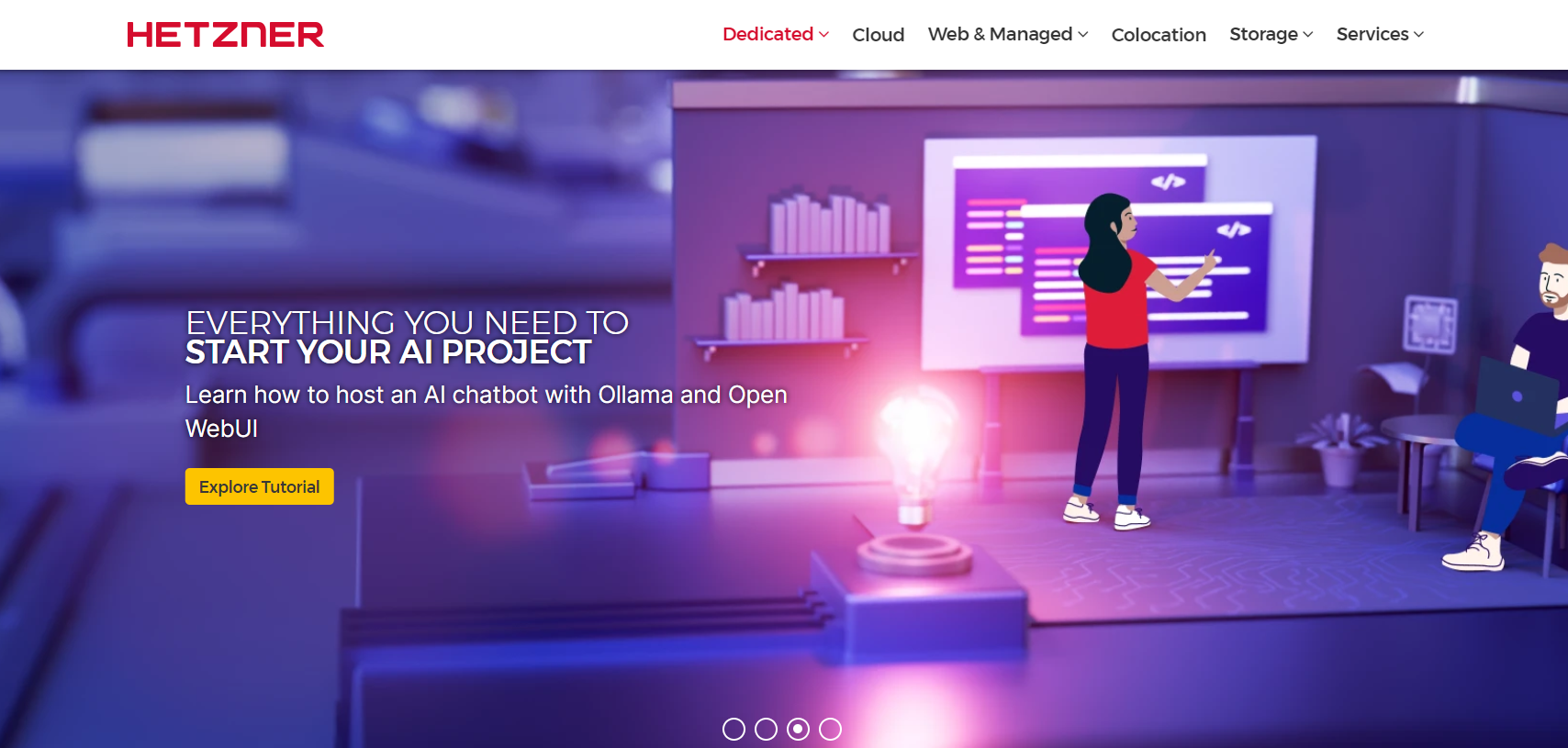
DreamHost impresses with a 100% uptime guarantee and consistent high performance. Various performance tests show DreamHost maintaining excellent uptime with average response times ranging from 0.342 seconds to 255 ms. The host also efficiently handles stress tests and ensures reliable server speeds with SSD drives.

Hetzner Online, with a solid 99.9% uptime guarantee, offers high reliability and network availability. Their data centers in multiple global locations and 24/7 monitoring ensure prompt issue resolution. Moreover, Hetzner’s use of Juniper backbone technology and free DDoS protection make it a robust choice for securing high server availability and performance.
Which one has better hosting performance?
Score Components:
- Hosting speed (30%): This includes SSD quality, Load times, PageSpeed score ranges,
additional information on website speed, built-in plugins for performance enhancement, available caching
methods, and CPU/RAM options - CDN (20%): Considers whether CDN is available or not, whether it’s free or paid, and
the quality of the CDN service - Available data centers (30%): Evaluates the number of data centers and their locations
globally. - Scalibility (20%): Looks at whether elastic scaling is available, the process required
to scale (manual upgrade vs. automatic scaling), the presence of dedicated servers, and the costs
associated with scaling.
 7.8
7.8
 8.3
8.3
🏆 Winner Hetzner: Offering a range of hosting options with strong performance and high reliability.
When comparing the general performance of DreamHost and Hetzner, Hetzner slightly edges out with its robust offerings. Both providers use high-speed SSD storage, but Hetzner leverages NVMe SSDs which are known for superior read and write speeds. DreamHost enhances performance with server-level caching and NGINX hosting. In terms of data center locations, Hetzner offers a broader geographic spread with centers in Germany, Finland, and the USA, compared to DreamHost’s unspecified multiple locations. However, DreamHost includes built-in caching via their DreamPress plans, which can significantly boost speed without additional plugins.
Website Speed
Website speed is a crucial factor for any hosting service. DreamHost features SSD storage, server-level caching, and NGINX hosting, which contribute to faster load times and optimized performance. Hetzner, on the other hand, utilizes NVMe SSDs and includes daily backups and high-performance hardware like Intel® Xeon® and AMD EPYC™ processors, ensuring even faster read and write speeds. While both offer competitive speeds, Hetzner’s NVMe SSDs and option for dedicated vCPU provide an edge for those requiring top-tier performance.
Scalability
Scalability is essential as websites grow. DreamHost offers expandable RAM and storage, and uncapped bandwidth, allowing for gradual scaling without immediate plan upgrades. They also feature dedicated servers starting at $199.00/mo. Hetzner offers flexible scaling options with shared and dedicated vCPU choices, along with high-performance servers like Intel® Xeon® Gold. Furthermore, Hetzner does not require minimum contracts, making it easy to scale up or down based on need. Pricing for specific scaling options isn’t disclosed but given their flexible approach, it’s likely competitive. Both hosts provide good scalability, but Hetzner’s no minimum contract and versatile CPU options provide added flexibility.
Which one has better security features?
and regulatory requirements
Score Components:
- Technical security measures (40%): This includes encryption, firewalls, DDoS
protection, secure configurations, server monitoring, access control and availability of security addons
(e.g Sitelock security). - Operational security measures (30%): Encompasses data privacy, backups and data
redundancy. - Compliance and certifications (20%): Adherence to legal and regulatory requirements
(e.g., GDPR, HIPAA) and possession of certifications (e.g., ISO 27001, SOC 2). - Business and reliability (10%): Factors in the provider’s reputation, uptime
guarantees, and customer support.
 7.8
7.8
 8.8
8.8
Winner:
Hetzner Online: Hetzner provides a robust set of security features and efficient operational measures.
Both DreamHost and Hetzner, have notable differences in their approaches to technical and operational
security, as well as in their compliance with regulations.
Technical security measures:
DreamHost and Hetzner both offer extensive technical security features, but Hetzner stands out with its ISO 27001 certification for its data centers. Both providers support multiple PHP versions and OPcache for improved performance. DreamHost offers free SSL certificates through Let’s Encrypt and allows third-party SSL installations, while Hetzner features free SSL certificates from both Symantec and Let’s Encrypt. However, DreamHost does not support wildcard certificates, while Hetzner’s SSL offerings are more basic.
Operational security measures:
DreamHost and Hetzner each provide DDoS protection to ensure uninterrupted service. DreamHost takes additional measures such as multi-factor authentication (MFA), DreamShield malware scanning, mod_security, SFTP, and SSH access. Conversely, Hetzner emphasizes comprehensive mail security, including DKIM, SPF, anti-spam filters, and a virus scanner, along with daily automated backups and around-the-clock monitoring. Both hosts offer secure file transfer protocols and encrypted connections, but Hetzner’s daily backup service adds an extra layer of reliability.
Compliance and certifications:
DreamHost is GDPR compliant and applies these regulations universally, even providing a Privacy Center for user data management. However, it falls short of HIPAA compliance and requires customers to obtain their own PCI certification. Hetzner also adheres to GDPR through a Data Processing Agreement (DPA) and operates under stringent European data protection laws but does not provide specific information about PCI or HIPAA compliance.
 |
 |
|
|---|---|---|
SSL certificate |
Free, No wildcard |
Free, No wildcard |
Additional security features |
MFA, DreamShield, mod_security, SFTP, SSH, RAID 1 |
DKIM, SPF, anti-spam filters, virus scanner, automated backups |
PHP versions |
PHP 8 |
PHP 5, PHP 7, PHP 8 |
GDPR compliance |
GDPR Compliant |
GDPR Compliant |
HIPAA compliance |
Not compliant |
Not specified |
PCI compliance |
Not for customer websites |
Not specified |
Hosting features
Score Components:
- Domains (20%): Assesses the availability of a free domain, domain purchase options, and
pricing - Email (15%): Considers if the provider offers full email hosting, or is reselling
third-party service, and if the email is only transactional or not - Website builder (15%): Checks if website builder is available, and it’s user
friendliness and overall the level of customization allowed. - Staging environment (20%): Determines if a staging environment is available, allowing
for testing changes before going live. - FTP & SFTP accounts (10%): Evaluates if and how easily users can access FTP and
SFTP accounts - Git and SSH access (20%): Assess whether Git is integrated into the hosting service and
if SSH access is provided
 7.9
7.9
 7.5
7.5
🏆 Winner DreamHost: A comprehensive solution with superior features and performance.
DreamHost and Hetzner are both notable hosting providers with robust offerings, but they cater to different user needs. DreamHost stands out with its inclusion of a website builder, free domain registration, and full privacy protection. It provides a user-friendly experience with various plans, from shared hosting to dedicated servers. DreamHost’s commitment to security, privacy, and customer support through 24/7 in-house experts makes it a well-rounded choice. Key features like free migration for certain plans and a custom-built control panel provide additional value to its users.
Hetzner, based in Germany, focuses on providing affordable, flexible hosting solutions, particularly for those who need advanced configurations. Hetzner’s offerings include a range of add-on domains, a detailed DNS administration, and extensive support for email and scripting languages. These features are beneficial for users seeking customization and control. Hetzner’s transparent pricing options for additional resources and its strong focus on GDPR compliance also make it an attractive choice for European customers.
 |
 |
|
|---|---|---|
Free domain |
Yes |
Yes |
Free SSL |
Yes |
Yes |
Email hosting |
Yes |
Yes |
Website builder |
Yes |
No |
Staging environment |
Yes |
Yes |
FTP & SFTP account |
Yes |
Yes |
Git and SSH access |
Yes |
Yes |
Free backup |
Yes |
Yes |
Money back guarantee |
Yes (97 days) |
No |
a location.
As a result in rare cases the features mentioned here can differ from the ones you see on their websites.
Both providers support a range of users from beginners to experts with user-friendly website builders and WordPress staging areas. However, in terms of developer tools, both DreamHost and Hetzner offer robust options including SSH access, support for multiple programming languages, and Git for version control, thus appealing to developers looking for advanced capabilities.
Email services:
Email services at DreamHost are provided through a partnership with Microsoft 365, offering a professional email and access to Outlook on a trial basis before transitioning to a paid service. Conversely, Hetzner provides unlimited free professional email accounts, which is particularly beneficial for users requiring multiple email accounts without incurring additional costs.
Price
Score Components:
- Plan value (40%): What each pricing tier offers.
- Transparency and clarity (30%): Clearness of pricing structures.
- Flexibility of plans (20%): Range of options to suit different budgets.
- Hidden costs (10%): Additional expenses not included in the plan.
 8.2
8.2
 7.9
7.9
🏆 Winner
DreamHost: Offers a diversity of hosting plans, ensuring competitive pricing and multiple features to cater to different needs.
Evaluating the pricing of plans among various hosting providers can be complex due to their differing pricing and renewal strategies. Additionally, certain plans require annual commitments, which adds to the difficulty of making comparisons. The prices listed are based on monthly commitments; plans requiring annual commitments are indicated. Additionally, although some providers offer identical plans for WordPress and shared hosting, we have created separate tables for each to enhance clarity.
DreamHost and Hetzner present rigorous pricing structures with various features. DreamHost caters to users with simpler to more demanding needs with its Shared Starter at $5.99/mo and VPS Professional at $46.99/mo, offering notable perks like free domain registrations, SSL certificates, and automated daily backups. Hetzner reflects a similar tiered approach with competitive prices, starting at €2.09/mo for Level 1 shared hosting, ensuring unlimited traffic and diverse domain options with solid backing from its German-based infrastructure. For managed WordPress hosting, DreamHost’s DreamPress plans range from $19.99/mo to $89.99/mo, unlike Hetzner, which embeds WordPress capabilities in more generalized hosting plans.
 |
 |
|---|---|
|
DreamPress $19.99
– Host one WordPress website. Value for price:8.2
|
N/A
Value for price:N/A
|
|
DreamPress Plus $34.99
– Host one WordPress website. Value for price:8.3
|
N/A
Value for price:N/A
|
|
DreamPress Pro $89.99
– Host one WordPress website. Value for price:8.5
|
N/A
Value for price:N/A
|
 |
 |
|---|---|
|
Shared Starter $5.99
– Host one website. Value for price:8.0
|
Level 1 €2.09
– Host one website. Value for price:7.5
|
|
Shared Unlimited $10.99
– Host unlimited websites. Value for price:8.5
|
Level 4 €5.39
– Host one website. Value for price:8.0
|
 |
 |
|---|---|
|
DreamCompute $10.00
– Scalable cloud computing. Value for price:8.0
|
CX11 €4.51
– 1 vCPU, 2GB RAM. Value for price:8.1
|
|
N/A
Value for price:N/A
|
CPX11 €5.18
– 2 vCPU, 2GB RAM. Value for price:8.2
|
|
N/A
Value for price:N/A
|
CX21 €6.37
– 2 vCPU, 4GB RAM. Value for price:8.4
|
As a result in rare cases the prices displayed here can differ from the ones you see on their websites.
Enterprise plans
DreamHost enterprise hosting offers a comprehensive choice through its Dedicated Hosting plans, starting from $199.00/mo with 16GB RAM and scaling up to $299.00/mo including 32GB RAM and uncapped bandwidth. Hetzner provides Managed Server VMs and high-performance cloud options with configurations like the CCX53 at €229.06/mo, sport 32 vCPUs and 128GB of RAM. Enterprises with high bandwidth and storage needs may find DreamHost’s promise of uncapped bandwidth more appealing, whereas Hetzner leverages cost-efficiency with flexible and potent cloud infrastructure.
Dreamhost vs Hetzner: Ease of setup
platform.
Score Components:
- Site migration (25%): Assesses whether the provider offers tools for site migration,
either automated or manual, and whether these services are free or require a fee. - Admin panel usability (35%): Evaluates the type of admin panel provided, such as the
standard cPanel or a custom solution, focusing on its accessibility and user-friendliness for both
technical and non-technical users. - Setup features (20%): Examines the availability and ease of use of various setup
features, including FTP accounts, file managers, email account setup, PHPMyAdmin, and easy CDN
configuration. - Help center quality (20%): Measures the quality and accessibility of the provider’s
help center resources, including articles and tutorials.
 8.9
8.9
 8.0
8.0
🏆 Winner
DreamHost: Easy setup and extensive support resources.
DreamHost offers a custom-built control panel known for its user-friendliness. The panel allows easy account administration and access to advanced features such as SFTP and WP-CLI. Non-technical users will find the intuitive design accessible, and technical users can appreciate the control it provides. The inclusion of one-click installation for WordPress and other applications enhances the simplicity of managing a website.
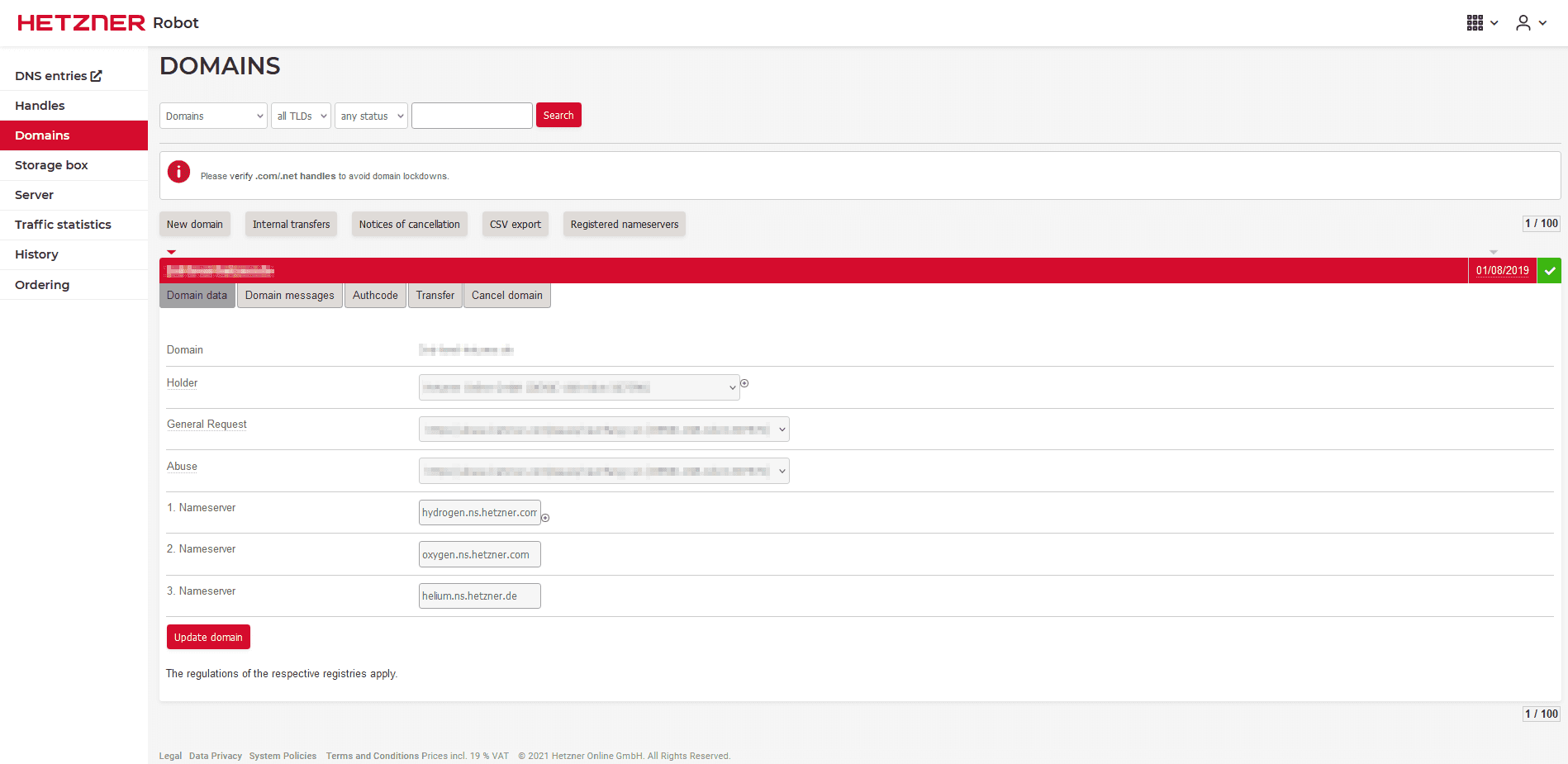
Hetzner uses the konsoleH administration interface, offering a straightforward experience, particularly for those familiar with managed servers. konsoleH allows you to manage domains, emails, and other server data effectively. While it may seem less user-centric compared to DreamHost’s panel, it provides a solid array of features that cater well to technical users. Non-technical users may experience a steeper learning curve with konsoleH but will find sufficient documentation to assist them.
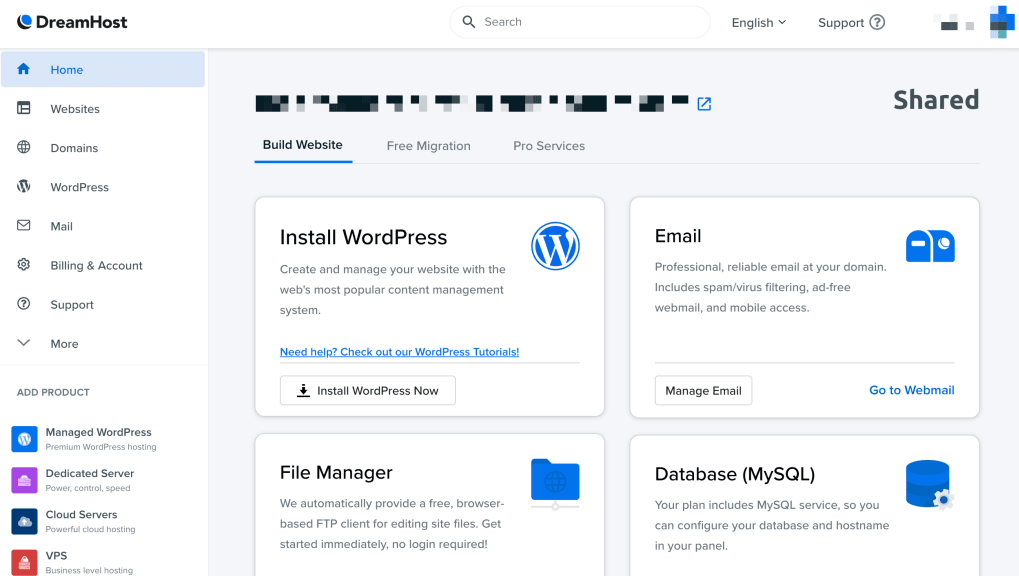
DreamHost’s Migration Dashboard makes site migration straightforward by scanning your site and presenting migration options. The guided process is user-friendly and aimed at reducing downtime. Most migration tools are integrated and don’t require extra fees, simplifying the process for new users. Hetzner provides comprehensive documentation for manual and automated migrations through konsoleH. Though effective, these migrations might require more technical know-how and time, potentially incurring extra costs for added services.
DreamHost’s help center includes 24/7 support via chat, email, and an extensive knowledge base with guides and tutorials. The support team comprises WordPress core contributors, ensuring expert-level assistance. Hetzner also offers 24/7 support via telephone and email with well-trained technicians. Their documentation is comprehensive and includes community contributions. Users can rely on this practice-oriented help center for effective problem-solving.
User management
accessibility.
Score Components:
- Role customization (40%): Flexibility in creating and defining user roles and
permissions. - Ease of management (30%): User interface and tools for managing users.
- Access control (20%): Effectiveness of access control measures for different user
levels. - Scalability (10%): Ability to manage a growing number of users efficiently.
 8.1
8.1
 7.8
7.8
🏆 Winner DreamHost: Provides more versatile and accessible user management features.
DreamHost and Hetzner Online both offer extensive options for user management, catering to a variety of needs. DreamHost stands out by offering unlimited SFTP users and a user-friendly control panel that simplifies the management of various domains and services. Hetzner, conversely, focuses on creating and managing user groups, making it easy to define storage quotas and assign admin roles. However, DreamHost’s provisions for Subversion repositories and crontab access cater to more advanced user management needs, making it a more versatile option.
DreamHost provides an intuitive custom-built control panel for managing domains, emails, FTP & SSH access, and more. This interface is designed to streamline user management tasks and supports advanced configurations like password protection for directories. Hetzner’s approach involves navigating through user settings via the profile icon, which might not be as seamless but offers robust functionalities for creating users, assigning them to groups, and setting storage limits. Both platforms offer SSH access, although DreamHost also features a crontab for scheduling tasks, adding another layer of functionality.
When it comes to access control and managing a growing number of users, DreamHost’s array of options like unlimited SFTP users, secure SSH access, and password-protected directories provide robust measures for effective user management. DreamHost also allows for detailed management of user roles through a centralized control panel. Hetzner offers comprehensive user activity tracking and the capability to set storage quotas and review user activities with flexibility, but its tools for immediate user access and control aren’t as extensive as DreamHost’s. Both platforms handle a growing user base efficiently, but DreamHost offers more specialized features for advanced user needs.
DreamHost User Roles Table:
| Role | Description | Access highlights |
|---|---|---|
| SFTP User | Grants secure file transfer access via SFTP | Full SFTP access to assigned directories, can manage file uploads/downloads |
| SSH User | Allows secure remote server access | Can execute command-line operations, manage files and directories |
| SVN User | For teams working on version control with Subversion | Access to Subversion repositories for collaborative code management |
| Crontab User | Schedules automated command-line tasks | Can create, edit, and schedule cron jobs |
| Email User | Manages email accounts with professional email @yourdomain support | Full control over email settings, sync, spam and virus filters |
Hetzner User Roles Table:
| Role | Description | Access highlights |
|---|---|---|
| User | Basic account for accessing services | Can access main services, subject to group permissions |
| Group Admin | Administer specific user groups | Can add/remove users, set permissions, manage storage quotas |
| Administrator | Full access to server settings | Complete control over all settings and user management |
Customer support
hosting provider.
Score Components:
- Support communication channels (30%): Measures the variety of customer support types
provided (live chat, chatbot, email, phone, etc.) - Availability (20%): Assesses the availability hours for each channel, including 24/7
support options. - Technical support quality (30%): Assesses whether the provider offers comprehensive
technical support, including hardware upgrades (e.g., HDD to SSD), software installations, and web
server configuration changes. - Enterprise support (20%): Checks if there are dedicated or priority support services
for enterprise-level customers.
 8.3
8.3
 6.3
6.3
🏆 Winner DreamHost: Offers extensive 24/7/365 support through multiple channels, with a 97-day money-back guarantee for shared hosting.
 |
 |
|
|---|---|---|
Phone support |
No |
Yes |
Live chat support |
Yes |
No |
Chatbot |
No |
No |
Email/ticket support |
Yes |
Yes |
Enterprise support (dedicated agent, priority support) |
Yes |
No |
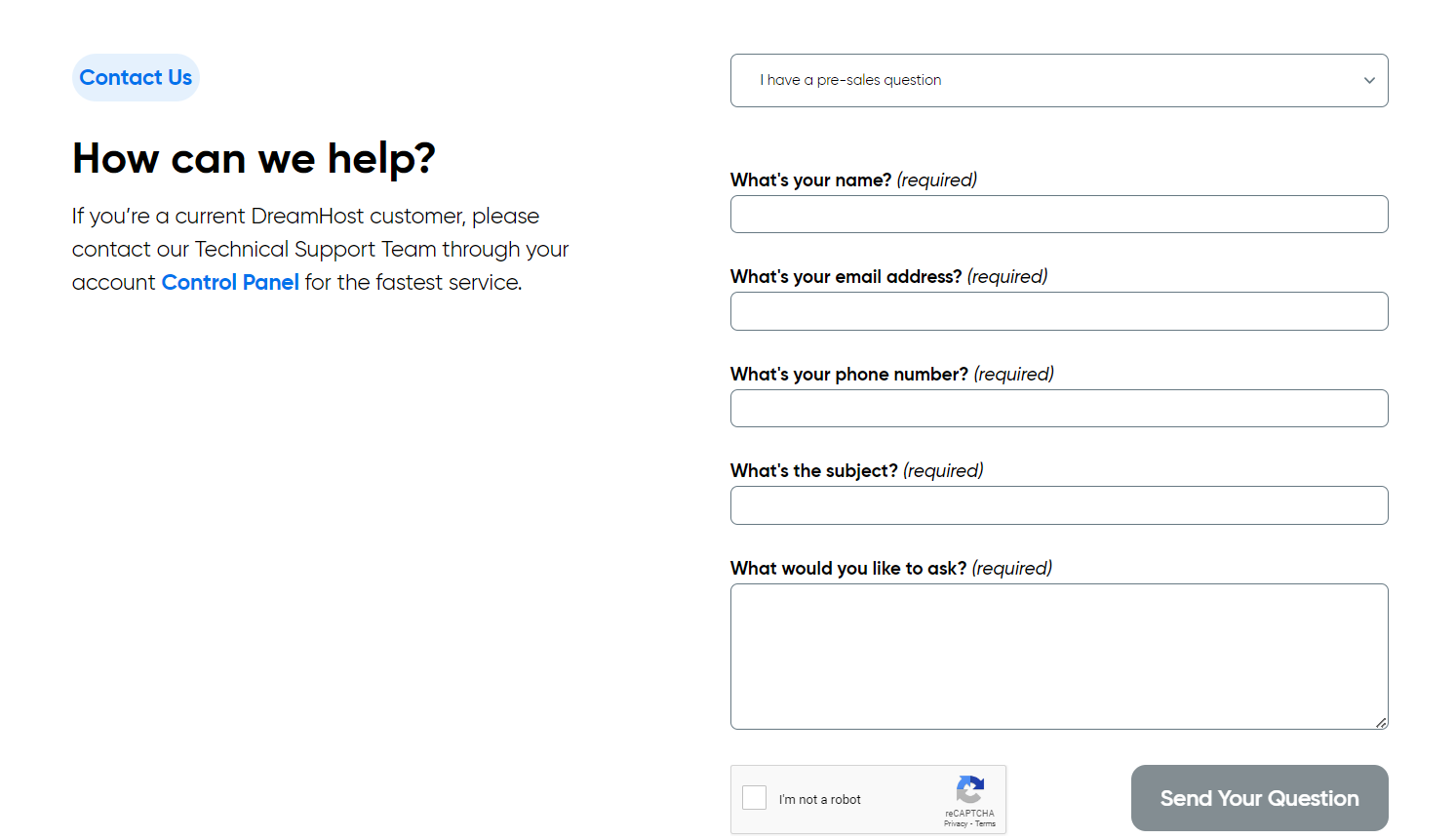
DreamHost and Hetzner provide different customer service experiences. DreamHost offers 24/7/365 support through various channels such as live chat, email, and a ticketing system. They also have a comprehensive knowledge base and offer professional services for additional fees. Despite lacking direct phone support, users can request callbacks for an extra fee. DreamHost supports both English and Spanish, ensuring that a broad user base can receive assistance in their preferred language.
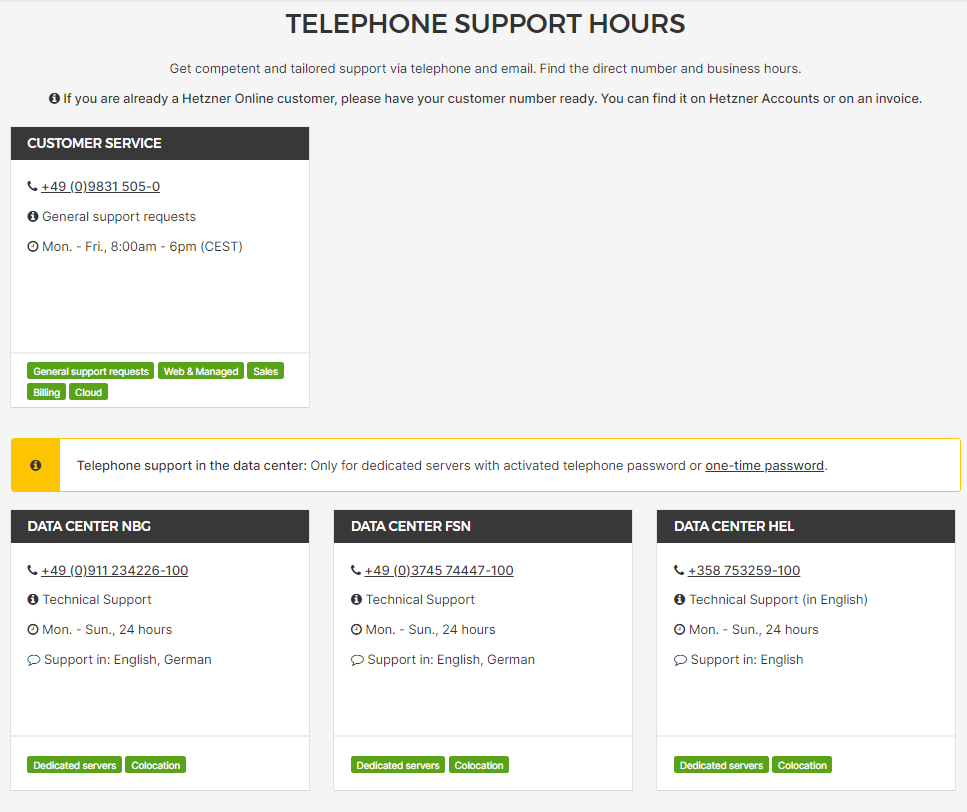
Hetzner, on the other hand, offers support via email, ticketing, and 24/7 phone support but only during business hours for phone assistance. While Hetzner supports multiple languages including English, German, and Russian, some users have reported unhelpful responses regarding account issues. Additionally, there is no live chat support, which some users find inconvenient. Unlike DreamHost, Hetzner does not provide a money-back guarantee or a free trial period, which may be a drawback for potential customers.
Dreamhost vs Hetzner: User feedback
DreamHost is a well-regarded hosting provider praised for its reliability, affordable pricing, user-friendly interface, and excellent performance. Users especially appreciate the responsive customer support, the easy navigation of the web portal, and a variety of hosting options suitable for different needs. However, common criticisms include the lack of phone support, occasional slow response times from customer service, and some challenges related to advanced functionalities and site migrations. While the majority of users report positive experiences, a few have faced significant issues with downtime and customer service, impacting their overall satisfaction.
Users generally find the hosting provider to be cost-effective with robust performance capabilities, able to handle demanding tasks reliably. Many reviewers appreciate the competitive pricing, ease of use, and the fast, reliable infrastructure. While customer support is often praised for its availability and helpfulness, some users believe it could still see improvements. The platform’s dashboard and additional features could benefit from enhancements, but overall, users are satisfied with the value and quality of service provided.
Dreamhost vs Hetzner: FAQ
Which platform is better suited for hosting WordPress websites?
DreamHost is better suited for hosting WordPress websites as it offers specialized WordPress hosting plans, optimized performance, built-in caching, and automated backups. Hetzner does not provide specialized WordPress hosting, making DreamHost the preferred choice for WordPress users.
Are both platforms suitable for beginners?
Yes, both platforms are suitable for beginners, but DreamHost offers a more user-friendly experience with its custom-built control panel, easy migration tools, and 24/7 customer support. While Hetzner has robust features, its control panel (konsoleH) may have a steeper learning curve for beginners.
Which hosting service offers better security features?
Both DreamHost and Hetzner offer extensive security features, but Hetzner stands out with its ISO 27001 certification for data centers. DreamHost provides multi-factor authentication, DreamShield malware scanning, and SFTP/SSH access, while Hetzner emphasizes email security, daily automated backups, and GDPR compliance.
What are the major differences in pricing and value between DreamHost and Hetzner?
DreamHost offers competitive introductory prices with features like free domain registration, automated daily backups, and a 97-day money-back guarantee for shared hosting. Hetzner provides lower setup fees, flexible scalability, competitive cloud hosting plans, and a strong focus on European customers. The choice depends on specific needs, with DreamHost being ideal for user-friendly plans and Hetzner for flexible, scalable options.
Which platform offers better customer support?
DreamHost provides 24/7/365 support through live chat, email, and a ticketing system, with a comprehensive knowledge base and a 97-day money-back guarantee. Hetzner offers email, ticket, and phone support but lacks live chat and a money-back guarantee, making DreamHost the more versatile option for customer support.
Which hosting service offers more scalability options for growing websites?
Both DreamHost and Hetzner offer good scalability options, but Hetzner provides more flexible choices with shared and dedicated vCPU options and no minimum contracts. DreamHost offers expandable RAM, storage, and uncapped bandwidth, but Hetzner’s versatile CPU options and flexible pricing structures make it a slightly better choice for scalable growth.
The making of this blog
We followed a clear, step-by-step process to write and research this article.









